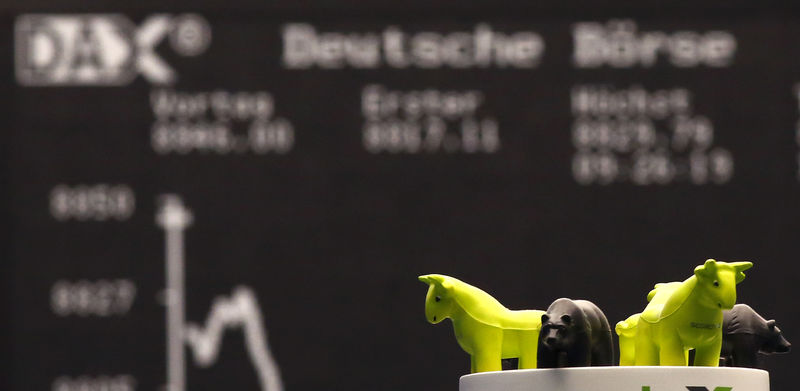Hertz Car Sales joins Amazon Autos platform for vehicle sales
By Peter Nurse
Investing.com - European stock markets traded sharply lower Tuesday, with investors cautious ahead of key central bank meetings, with inflation climbing sharply, while the ongoing Ukraine conflict looks likely to intensify.
By 3:40 AM ET (0740 GMT), the DAX in Germany traded 1.9% lower, the U.K.’s FTSE 100 dropped 0.9%, while CAC 40 in France rose 1.9%.
The European Central Bank is set to hold its latest policy-setting meeting on Thursday, and ahead of that German consumer price inflation rose 2.5% on the month in March, up a massive 7.3% on the year.
The U.S. inflation equivalent number is due later in the session, and investors are bracing for price gains running at their highest level in four decades. This will be the last time the Federal Reserve will see official consumer price index data before its May meeting.
Elsewhere, data released earlier Monday showed the U.K. unemployment rate fell to 3.8% in February, dropping to its lowest level since 2019.
Also of interest later in the session will be the German ZEW economic sentiment index, which is expected to show a drop in confidence in the Eurozone’s largest economy in April, with the war in Ukraine weighing.
This conflict looks set to intensify, with Russia said to be amassing troops in the eastern Donbas region of Ukraine for a new assault on the port of Mariupol.
In corporate news, easyJet (LON:EZJ) stock fell 1.3% after the budget airline predicted it will have lost over half a billion pounds in the six months through March. However, the carrier said Tuesday it has experienced a "strong, sustained recovery" in bookings since the U.K. lifted its COVID-19 restrictions.
Deutsche Bank (DE:DBKGn) stock fell 9.6% and Commerzbank (DE:CBKG) stock dropped 8.3% after an unnamed sold stakes late Monday of more than 5% in Germany's top two lenders, while Novartis (SIX:NOVN) stock dropped 1.1% following reports the Swiss drugmaker is set to cut thousands of jobs worldwide as part of a reorganization.
ASOS (LON:ASOS) stock rose 0.4% after the online retailer maintained its full-year guidance despite reporting an 87% fall in first half profit, reflecting supply chain constraints.
Oil prices rose Monday, rebounding after recent losses after China eased some of its COVID-related lockdowns, lifting some of the worries about oil demand from the world’s largest importer.
Additionally, the Organization of Petroleum Exporting Countries warned that losses from Russian sources due to sanctions could be as much as seven million barrels per day, adding that the volume will be “impossible” to replace.
This follows a meeting between OPEC and European Union officials, with the EU currently drafting proposals for an oil embargo on Russia in the wake of its invasion of Ukraine.
Investors now await U.S. crude oil supply from the American Petroleum Institute, due later in the day.
By 3:40 AM ET, U.S. crude futures traded 2.7% higher at $96.83 a barrel, while the Brent contract rose 2.6% to $101.05. Both benchmarks dropped around 4% on Monday, after recording last week their second consecutive losing week.
Additionally, gold futures rose 0.4% to $1,956.40/oz, while EUR/USD traded 0.2% lower at 1.0866.
